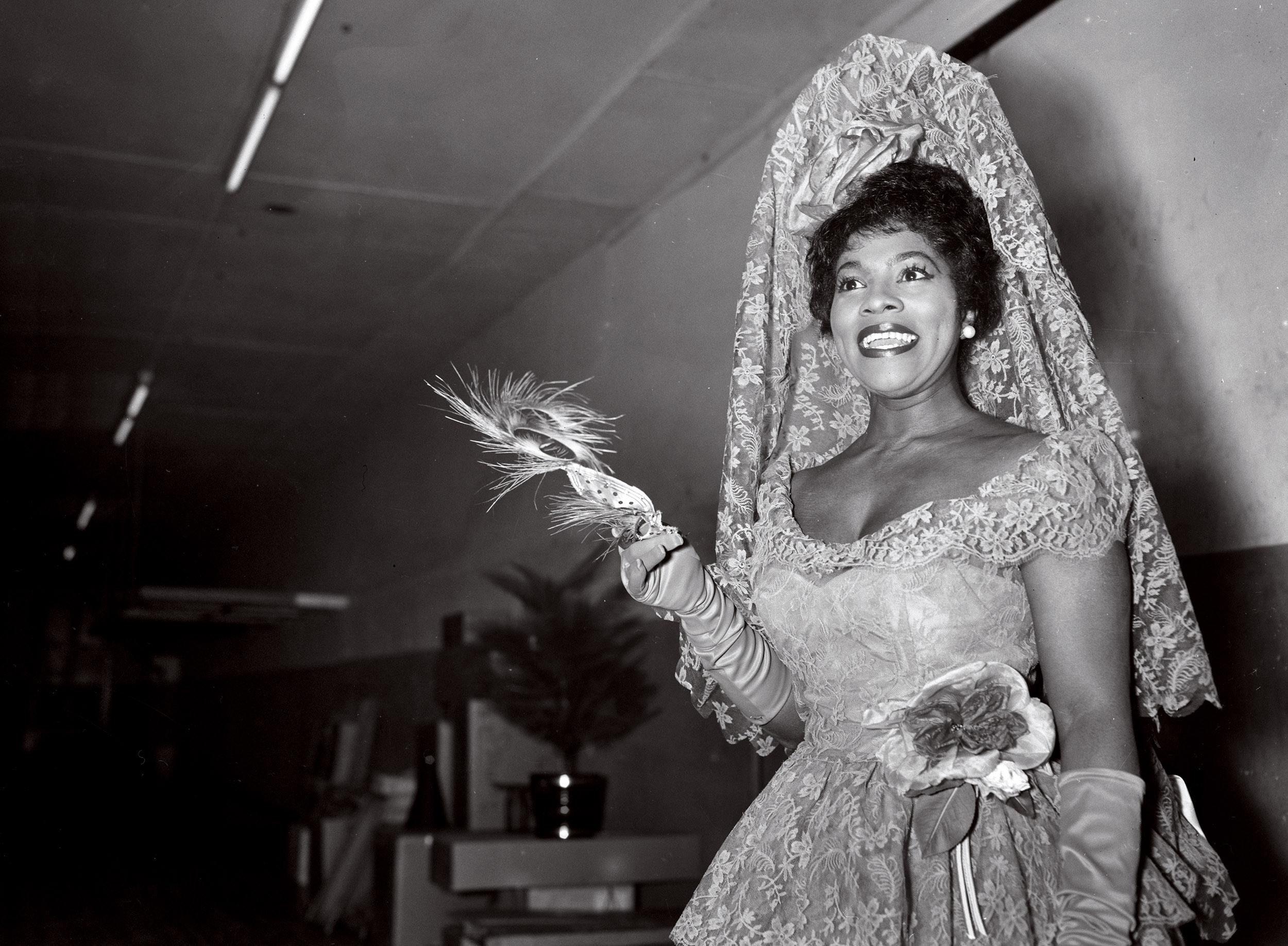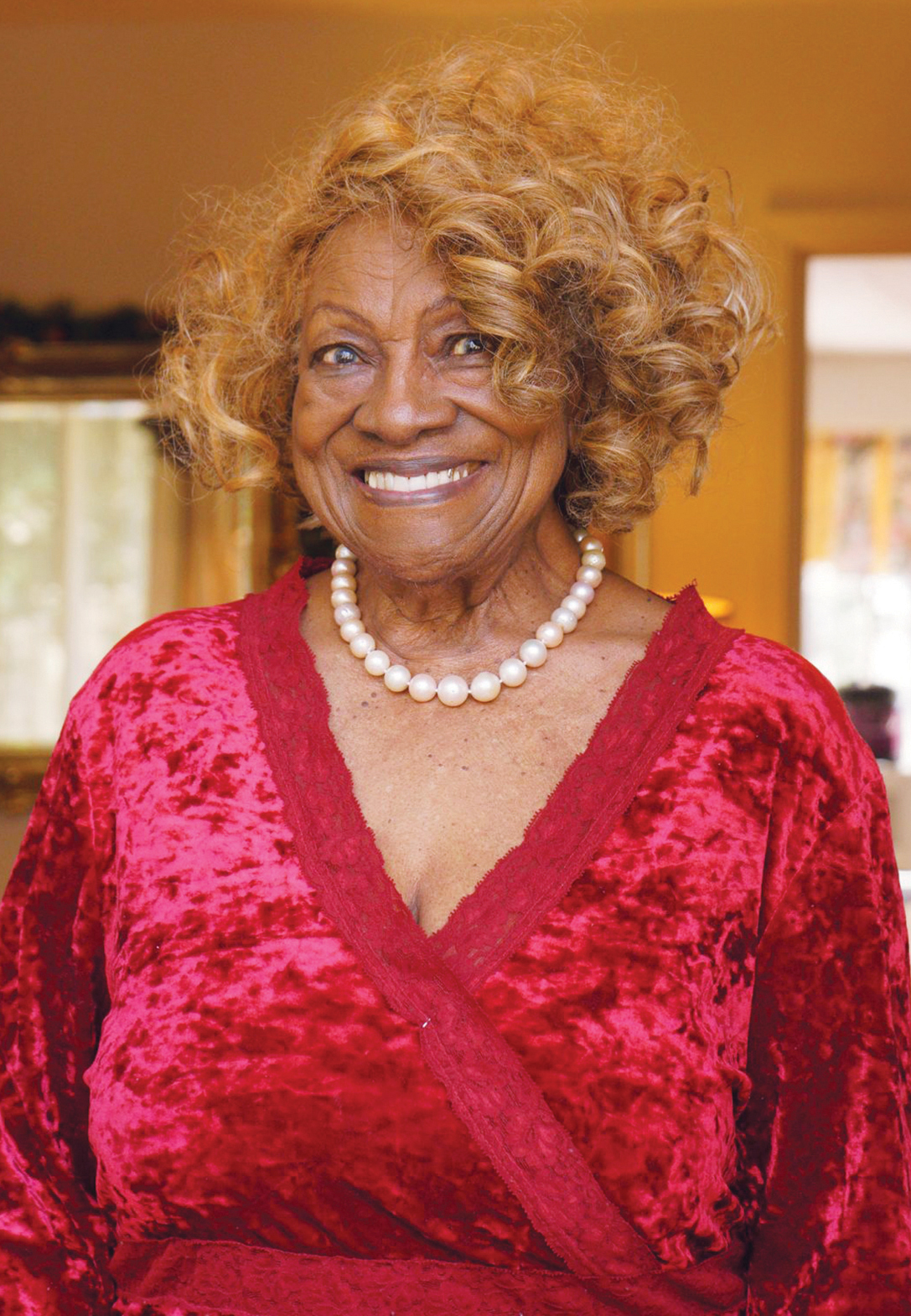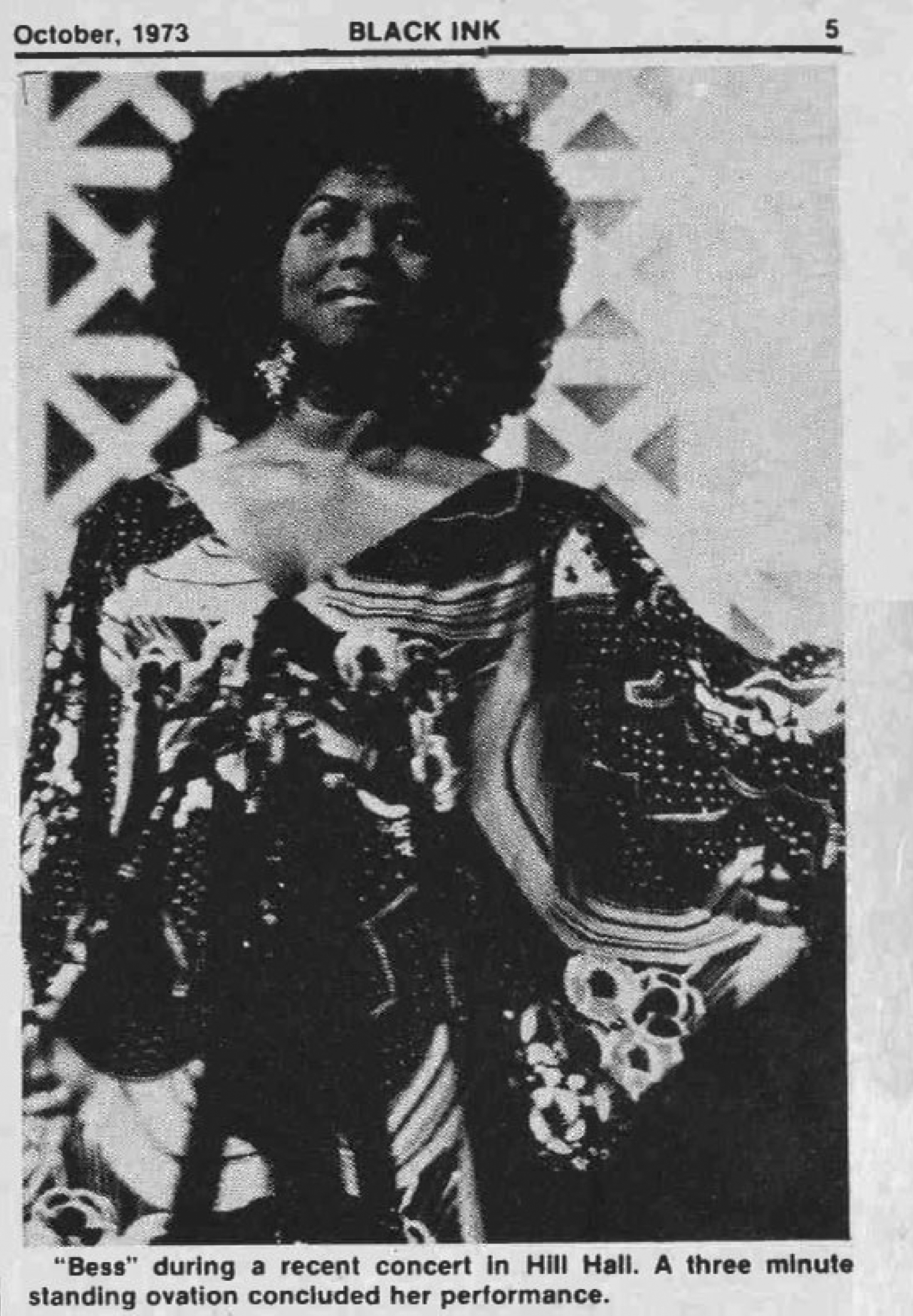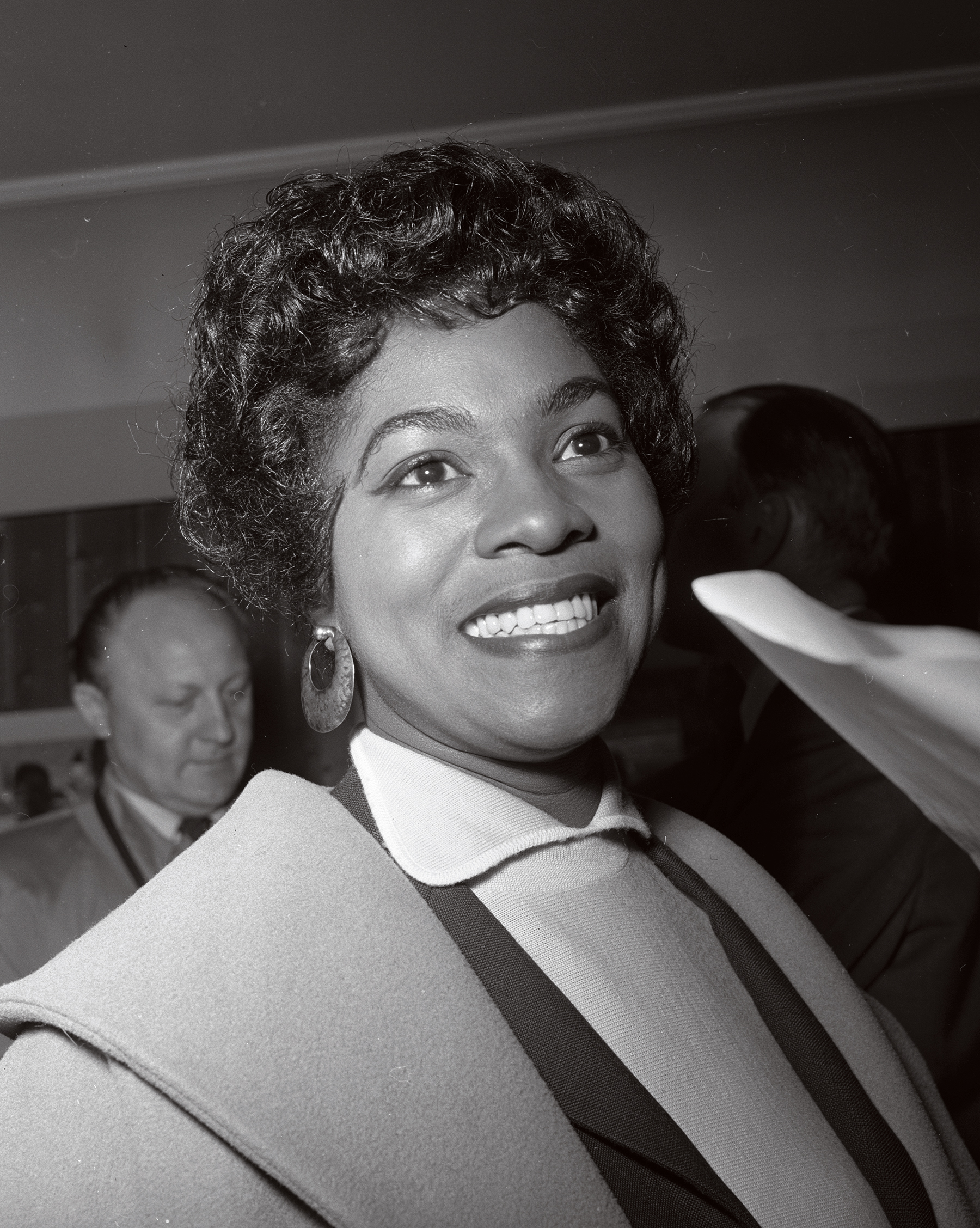A Diva for Diversity
Posted on July 29, 2021
Martha Flowers performed in the blues opera Free and Easy by Harold Arlen in Amsterdam in 1959. (Joop van Bilsen/Wikimedia Commons)
The night after Christmas in 1955, Martha Flowers stood onstage at the Leningrad Palace of Culture, taking the last solo curtain call as 2,300 Russians stood and applauded her star performance in the city’s premiere of the great American opera, Porgy and Bess.
“Three minutes passed — four, five, six, seven,” Truman Capote wrote in The New Yorker, before Flowers blew “a last kiss across the footlights.”
Three years earlier, the applause had come from farmers and shopkeepers in a high school auditorium in Iowa, where, as one of the most talented singers of her generation, she performed in a concert series sponsored by the Shelby County Mutual Concert Association.
For Flowers and other Black American performers in the middle of the 20th century, that’s how it was. At home, opportunity was elusive.

Flowers at her home in Chapel Hill in 2021. (Jock Lauterer ’67)
Now, for the University, opportunity is Flowers’ legacy — through the students she inspired, the inclusion she helped to usher in, and soon, through an eponymous opera institute that may raise professional curtains for young singers with far more talent than means.
Guiding the dreams of students
Martha Flowers was always drawn to students with big dreams and few, if any, outlets to chase them.
During three decades as a world-traveling opera soprano, far from her childhood home in Winston-Salem, she had taken time to work with disadvantaged children who had performing talent. In 1973, it was time to settle somewhere and guide the dreams of young adults.
She had not wanted to return to the South, where she had experienced “real segregation,” she said later — but she chose to join the faculty in the UNC music department. Why? Because she saw Black students there but no Black instructors, she told the campus magazine Black Ink at the time. She was needed.
And what she would bring, she later told The Daily Tar Heel, was something students of color lacked — the knowledge “that it is possible to be a success.”
T. Dianne Bellamy-Small ’74 calls herself Flowers’ first pupil.
“I was a senior when Martha Flowers came to Chapel Hill,” she recalled. “My junior year had been quite difficult — I lost three grandparents in a matter of three weeks.” And her voice teacher, she said, wasn’t interested in bridging cultural and musical differences with “a very strong-willed African American student.”
“The department’s music board didn’t know exactly what to do with me because I had been unable to perform my junior recital because of the death of my grandparents, and they wanted me to stay [an extra] semester just to do my senior recital. I was a scholarship student, so I would not have had the money to stay.
“No other instructor wanted to take me on … and then Martha Flowers was hired.”
UNC music faculty are working to create the Martha Flowers Opera Institute — a four-week program for young BIPOC opera singers, conductors and stage directors — with an eye toward making opera training free and accessible to a more diverse group of artists.
Bellamy-Small also grew up in Winston-Salem. “We immediately found a common bond,” she said, and Flowers, with a “hands-on” style, helped her complete her junior recital in the fall of her senior year. Then it was time to work on the senior recital, in the spring.
“One day at the beginning of the semester, I had not prepared the interpretation of the songs that I was assigned to work on,” she said. “Miss Flowers and I had an argument. Because I was still dealing with the death of my grandparents, I felt defeated and wanted to quit. So I ran out of her studio, and she followed behind me. I sat down on the steps in front of Hill Hall, crying.
“She came down the steps and stood in front of me and grabbed me by my shoulders and said, ‘No pupil of mine is going to quit.’ She told me her success and mine were linked and that I was going to get off my butt and do the work, and she was going to help me become the best singer I could be.”
Bellamy-Small came back in, did the work and graduated that spring with a bachelor’s degree in voice performance. She still sings regularly in the Triad, where she is a member of the Guilford County school board.
Stage presence
Flowers did know a little about persistence.
She was introduced to music in church growing up a minister’s daughter, and she was confident she could sing for a living. She applied to Fisk University in Nashville, Tenn., because it was a Black college with a music school that her parents could afford. After graduating and heading to New York, she won a four-year scholarship to the Juilliard School in Manhattan, where legendary voice teacher Florence Kimball inspired her, she said later, as a mentor who took real interest in her students.
As she was finishing at Juilliard in 1954, Robert Breen, director of the Everyman Opera Company, saw her perform in Mozart’s Così fan tutte and hired her for the chorus in an international tour of the Gershwins’ Porgy and Bess.

“Keep an eye on your goals,” Flowers told UNC student publication Black Ink in 1973. “Don’t let anyone or anything hinder you from what you want to do or be.”
Soon she was playing Clara, then the Strawberry Woman, and then Bess herself, as the company performed for two years in Canada and across Europe: Paris, Berlin, Athens, Leningrad (now St. Petersburg), Moscow and Prague. Maya Angelou, who was in the company, later said Flowers’ voice was like “hot silver melted.”
Flowers was a star — until she came back to the States.
“It was tremendously disappointing,” she told Jan Johnson Yopp ’70, a then-faculty member in journalism at UNC, in 1979. “At that time doors were closed to Black entertainers, except those with big names. It was back to church jobs and auditions.”
And Flowers never made that “big name.” But she never lost the love of performing. So for more than a decade, she did what was open to her — on tours of much of Europe, plus Asia, Africa, South America and New Zealand, as well as some U.S. performances.
When she came to UNC, she astounded faculty and students with the same versatility and artistry she had displayed on tour. She could do it all — French and German art songs, classical compositions, spirituals and modern works in addition to opera.
Terry Rhodes ’78, a music professor and now dean of the College of Arts and Sciences at UNC, attended her recitals as a student and remembers “her gorgeous voice and her elegance and presence and graciousness” on stage.
“She beautifully sang spirituals, but the way she could sing a French mélodie, whether it was Poulenc or Debussy, or Hugo Wolf and lieder … she’s just a beautiful musician.”
“She could really hold the stage,” recalled Stafford Wing, a professor emeritus of voice. And that stage could be anywhere.
“In Hill Hall I taught opera in [Room] 103, just off the rotunda,” Wing said. One day, in walked Bess, straight off Gershwin’s Catfish Row — but a bit more glamorous.
“She came in and she sang My Man’s Gone Now, and she sang The Strawberry Song, in a lovely dress that had strawberries all over it” while the students watched from five feet away, Wing said. “Oh, they loved her.”
Flowers’ personality, it seems, has always been bigger than her stature (Capote called her “small and perky”). Well into her 90s, she often has been seen around town, dressed in style and driving her yellow Mustang convertible. (She won’t tell anyone her age, but you can do the math.)
Three members of the music faculty — department Chair David Garcia and voice professors LaToya Lain and Mark Callahan — met with her at a Chapel Hill restaurant last summer, in an outing that Callahan now calls “The Diva Does the Bartaco.”
“I was expecting this little, grouchy old lady,” Lain said, “and David walks in with her — and she’s got the blonde hair, and her jewelry and her makeup, and I knew she was going to be spicy. And she had so many little stories and little snippets, and she would only give you so much … she’s like, ‘I’ll tell you about that in my memoirs.’ She kept us giggling the whole time.”
“They play really loud music” at Bartaco, “and it was really fun music,” Callahan said. “She jumped right on that bench that we were sitting in, the higher bench, and she was just feeling that music.” She told them a story about doing the tango in a nightclub in South America, he said, and “how important it was for her to ‘dance the language’ ” of whatever country she was in.

Flowers at a production of Porgy and Bess in Copenhagen in 1956. When she came to UNC to teach in 1973, she astounded faculty and students with the same versatility and artistry she had displayed on tour. (Dagbladet/Norsk Folkemuseum)
A legacy in tune
At UNC, Flowers was serious about empowering people and expanding their opportunities. In spring 1976, she created the department’s first course in Black American music. In 1977, she persuaded her friend, Metropolitan Opera star Leontyne Price, to give $1,000 to help a Carolina student spend a summer at Aspen Music School in Colorado.
And as an instructor, she launched the music department on a journey to inclusion that continues to this day. The faculty is now regarded as rich in diversity. Garcia, the chair, has a doctorate in ethnomusicology, and much of his research focuses on Black and Latin music.
“We have a lot of work to do,” Rhodes said, but the progress “has been built on the shoulders of people like Martha.”
The next big step is the Martha Flowers Opera Institute.
The institute, co-founded by Lain and Callahan with a goal to open in 2023, will be a four-week program for young opera singers, conductors and stage directors who are BIPOC — Black, Indigenous and other people of color. The idea is “to make opera training free and accessible to a more diverse group of artists,” the grant proposal says. It will provide tuition, meals and housing for 10 apprentice singers, an apprentice conductor and an apprentice director, and tuition for 10 high school singers who can commute.
“I’ve done Porgy and Bess myself, I don’t know how many times,” Lain said. “And I’ve never had a Black director or Black stage director.” She and Callahan bumped into each other in a hallway a couple of years ago, she said, and started discussing: “How do we change that?”
Similar programs can cost up to $6,000, and they attract mostly white students, Callahan said. “We wanted to create a space where finances weren’t a barrier,” with audition opportunities and language and performance coaches from prestigious operas.
“We’d also like to introduce courses in history, and especially histories of Black performers,” Callahan said. “Starting with Martha Flowers.”
Flowers left UNC in 1979 and set up a studio for tutoring in her home, which was then in Carrboro. She still knew talent on sight, and she still could steer its course.
Louise Toppin ’83, a pre-med major who also played piano, entered UNC that year and dropped by Hill Hall. Flowers, she said, was standing in the hallway, “and she stopped me — and she said, ‘Who are you?’ And I said, ‘Well, I’m a pianist,’ and she said, ‘Oh, great. I’d like to hire you to come and play for my studio on Saturday mornings.’ ”
Toppin was so stunned, and so impressed, that she started walking every Saturday from campus to Flowers’ home in Carrboro to play. She kept going back for four years.
“I got to hear her wisdom, her enthusiasm, her kindness,” she recalled. “It was magical.” Pre-med no more, Toppin later returned to UNC as head of the voice department and is now a professor of voice at the University of Michigan.
One of Flowers’ students in her home studio was six-time Grammy nominee Nnenna Freelon, who said Flowers helped her “to suspend my inner judgment” and apply “the steady hand of love and discipline around the voice.”
“Her studio was a place of love,” Freelon said.
Flowers later moved to Chapel Hill, where she mentored performers for decades, dabbled in real estate, occasionally entertained and generally shared her presence with the town.
She hasn’t been out much recently because of ill health, which has limited even her phone contacts to a select few. But she still talks now and then with Garcia, and Lain is eager to sit with her this summer for conversations that will become a documentary, working with Carolina’s Southern Oral History Program.
And there’s still fundraising to do for the opera institute.
It’s all about standing and applauding a life that has enhanced so many others, before she blows that last kiss across the footlights.
“I think opera at UNC is in excellent hands,” Garcia said. “And I think Martha Flowers came to us for many reasons. All of this … it was all meant to be.”
— Eric Frederick ’81
Thanks for reading the Carolina Alumni Review
Carolina Alumni members, sign in to continue reading.
Not yet a member? Become one today.
